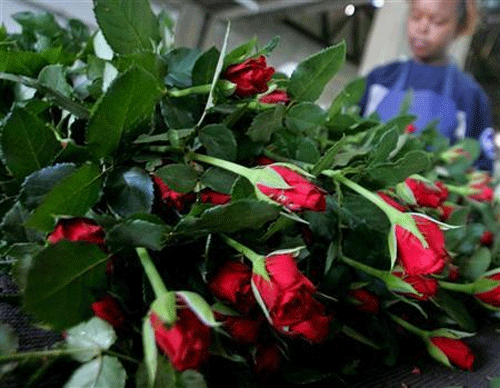
Indian-owned firms in Ethiopia are making flowers the country's third-largest export earner after coffee and khat, a kind of chewable cannabis.
In the last five years, the Ethiopian floriculture industry has become the second largest flower exporter in Africa (after Kenya) and fourth largest flower exporter in the world. According to one estimate, the export value earned by the country is expected to rise up to $550 million by 2016.
Revenues from flower exports have grown from $27.9 million dollars in 2002-03 to $178.3 million dollars in 2010-11.
Ethiopia has a comparative advantage in the production of roses, especially with favourable climate conditions and availability of labour. The Ethiopian Government also offered incentives to investors.
"Ethiopia has the ideal climate, appropriate conditions and stable, year-round temperature that can ensure better production and quality flowers. The region is acknowledged as one of the best flower growing areas," said the Ethiopian Horticulture Producers & Exporters Association (EHPEA).
Debre Berhan, at an elevation of 2,840 metres above sea levels, has the ideal climate to grow flowers.
One Indian company, ASK Flowers and Greens Plc, is in Debre Berhan town in Amhara regional state, 130 km north of the capital Addis Ababa, which exports 1.2 million flowers a year to European, Middle Eastern and African markets.
Shahab Khan, who set up ASK Flowers and Greens Plc in 2007 at an investment of 20 million birr (US$1 million), said he was putting in another 10 million and planning to enter the Russian market.
"The expansion will add 11 hectares and we expect it to grow over 400 percent of the current capacity," Khan told IANS.
The expansion will see the construction of greenhouses, pack houses, cold storages, irrigation systems, a farm managers' residence, a service water reservoir and a bore-well. "We also envisage entering the Russian market."
ASK was the first flower investment in Amhara. Debre Berhan mayor Getahun Zeke said a farm of ASK type, on a three hectare plot leased from the town administration, is one of the incentives for foreign investors in the country.
In 2012, another Indian, Sanjay Bengali, had set up Esimo Flowers & Agro Industries Plc in the same area with an investment of 100 million birr (US$5 million). Esimo plans to harvest to 90,000 or 100,000 stems.
Bengali has earlier said his company would be growing roses that are bred locally and are similar to Ecuadorian and Colombian breeds.
Another Indian firm, Karuturi Global, is also engaged in the production of cut roses across Ethiopia and Kenya.